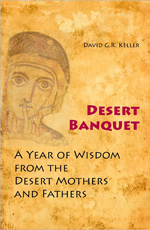Beginning around the third century and continuing to this day, Christian monastics established workshops for their spiritual growth in desert communities around the world. The earliest ones, known as the desert mothers and fathers, refined their ascetic practices and organized their lives around solitude, silence, hospitality, prayer, fasting, and hospitality. David Keller, an Episcopal priest, is adjunct professor of ascetical theology at the General Theological Seminary in New York City. He is the author of several books including Oasis of Wisdom: The Worlds of the Desert Fathers and Mothers.
Keller has organized this daybook of readings and commentary on the wisdom of these desert elders around 12 themes, one for each month of the year. Here are a few of the headings: The Mystery of Human Transformation, The Art of Monastic Life, Patience, Persistence in Prayer and Work, and Humility.
In the first chapter, Keller discusses some of the reasons why the desert fathers and mothers fled from the world — to get away from the conventional pressures of family life, labor, sexual activity, and material possessions. This fleeing, the author maintains, was not an avoidance of life but a way of letting go of attachment. The fathers and mothers found in the desert a place where they could listen to God in silence. Keller writes:
"The first step was silence. Solitude would create the space for a pattern of faithful listening to God and the centrifugal energy of the Spirit that would make transformation possible. The desert elders called this 'resting in God.' It is an environment of grace in which we place ourselves in God's hands in order to find ourselves and our reason for being alive."
Another intriguing chapter is on the art of human transformation where we see the effort and integrity of the desert elders as they confront roadblocks, discouragement, and their own weaknesses and failures. They were able to muster the courage to do so because of their reliance upon God.
Here is a sampler of some of the bits of wisdom uttered by the desert fathers and mothers:
• "It was said of Abba Agathon that for three years he lived with a stone in his mouth, until he had learned to keep silent."
• "The man who has learnt the sweetness of the cell flees from his neighbor but not as though he despised him."
• "Abba Paul the Great said, 'Keep close to Jesus.' "
• "Abba Poeman often said, 'We do not need anything except a vigilant spirit.' "
